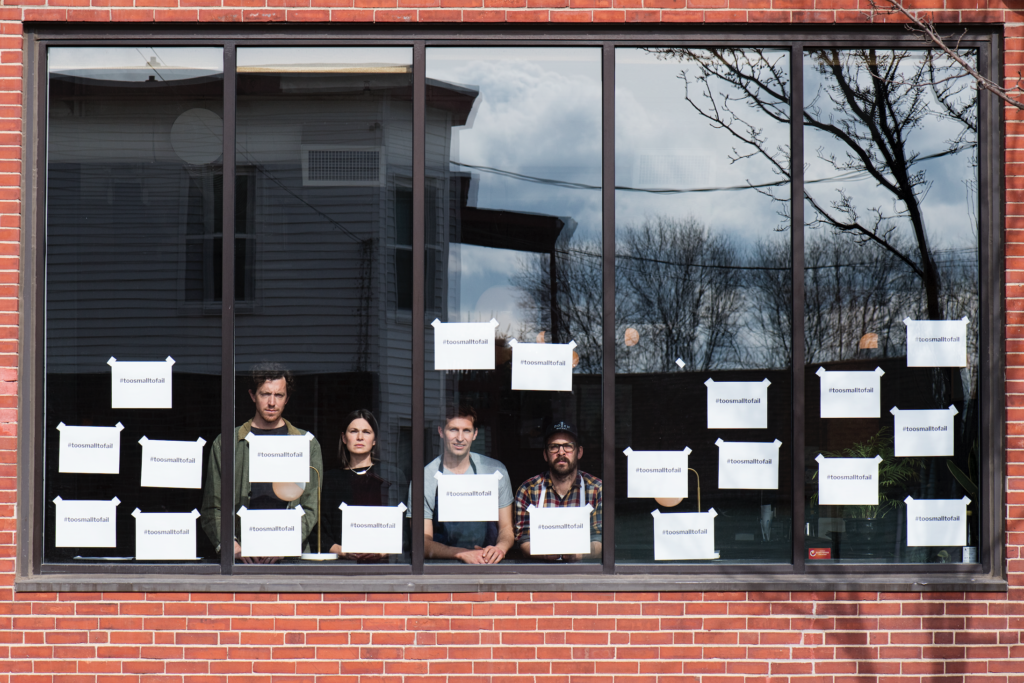Closed But Not Forgotten
Photographer Nicole Wolf’s Behind Closed Doors project documents the faces and families of Portland’s small-business community

Photographer Nicole Wolf has been working with Maine magazine and our sister publication, Maine Home+Design, for nearly a decade. In the past year, her work has included features on winter surfers and Rangeley’s Snodeo, much of our restaurant coverage, and the dramatic portraits in our new Interview department. When the coronavirus pandemic arrived in Maine and businesses began to close their doors, Wolf turned her lens on the people behind Portland’s small businesses. She photographed her first subjects, Pliny Reynolds, Melanie Kratovil, and their two children, on March 18, just a few days after they closed their Washington Avenue restaurant, Terlingua. Since then, she has taken more than 70 different portraits for her project, Behind Closed Doors, from owners of other restaurants to proprietors of retail shops and salons to musicians and craftspeople, all through the closed windows or doors of their storefronts or homes. She’s been publishing the photos and accompanying words from the subjects to her Instagram page.

What inspired you to do this project?
Like most creative artists, my work has come to a screeching halt. I work as a commercial and editorial photographer and have had several photoshoots put on hold, deposits have not come in, and there is no foreseeable timeline for when I will work consistently again. When I moved to Maine seven years ago, I made a conscious decision to plant roots and to support and be a part of my local community, including my work as a photographer. When the pandemic hit, my friends and my clients–my community–were suffering, and I could not sit idly by. As a storyteller I needed to convey in the best way I knew how their personal, relevant, and heartbreaking journeys. It has been a gut wrenching and emotional undertaking but one of profound strength and resilience. I think it might be the most poignant work of my career.
What are you trying to accomplish?
Initially, I just wanted to feel like I was giving back in some way by allowing my community to tell their stories through the image and their own words. I’ve been sharing it on social media platforms so that everyone felt connected by being able to see that their neighbors and friends were experiencing the same thing. The second stage of the project will be printing the images life-size to hang in the same windows or doors that I photographed the subjects in—an installation for those that walk or drive by to see and remember the faces of the community we all love so dearly. Lastly, I plan to also document the same people in the open doors and windows of their businesses if and when they do reopen. These images will be juxtaposed to each other in a book, which I hope to publish, with sales going to support our community in Portland, Maine.
What are the logistics of the process? Did you choose the subjects or did people reach out to you to be part of it?
I reached out to people over text and social media platforms, and the response was overwhelming. The only problem is I can’t photograph everyone—I so wish I could. I decided to stay pretty much on the peninsula in Portland and photograph a cross section of different businesses to represent the larger community. My hope is that people will see themselves in one or more of the images and that they are relatable to everyone who has had to shutter, for now, what they love so dearly.
What have been the reactions of the subjects and the general public?
People all over the state and the country have reached out to me to be a part of this project, sharing their own stories through messages and comments, and showing support from afar. It is incredible to witness how we all really show up for each other not only when things are good, but when times are tough. We live in a town of courageous, resilient, and generous people who have banded together to support one another through the most extraordinary time in our lives.
How has working on this affected how your perspective on the pandemic?
Bottom line, it has shown me that we are fighters. That when the chips are down we rise up. The innovation, kindness, integrity, and grit that our community has is an extraordinary thing to witness. I feel so indebted to be a part of this community and for you all to have been so open and vulnerable in front of my lens. Pandemic or not, Portland, Maine, is a true example that a rising tide lifts all boats.



